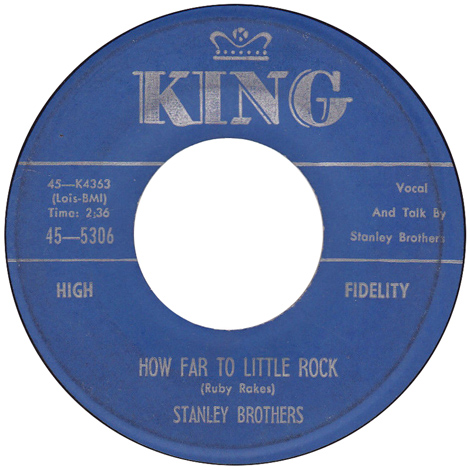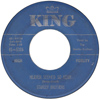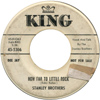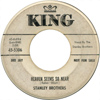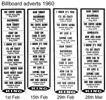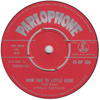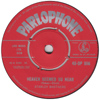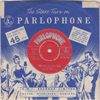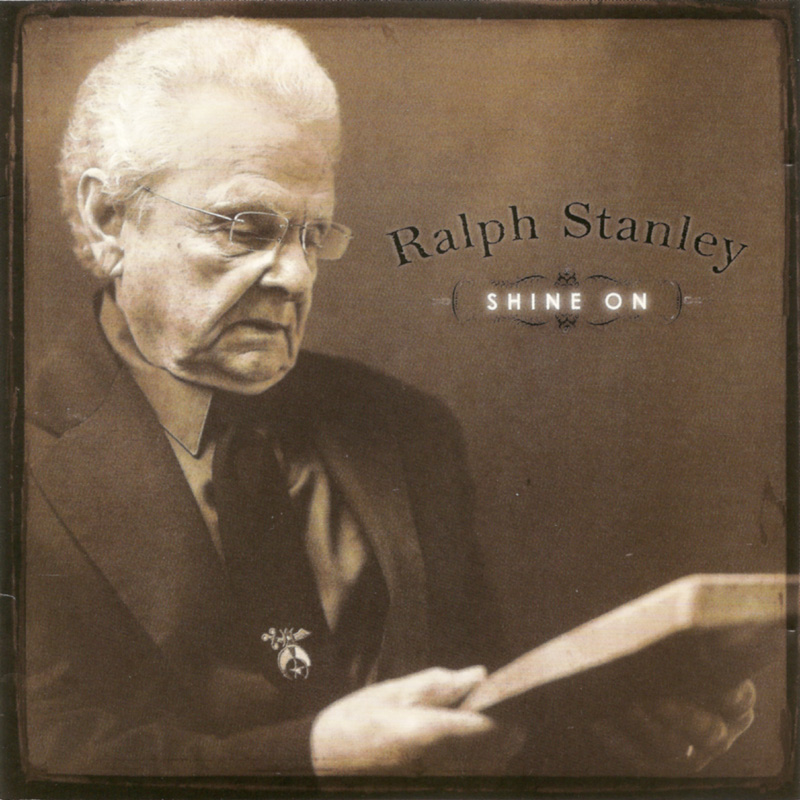- Bill Gatton Chevy Show
- Carter Stanley Interview - 1966
- Jim Kent's film 'Ralph Stanley's Bluegrass Festival'
- New WCYB Recording
- Pound Va. 1972 - Video
- Replica Rebel T-Shirt
- R.I.P. Ralph
- Roy Lee Centers Last Show
- Song & Memory Books
- Stanley Brothers - WCYB Acetate
- Stanley Standard - Carter Stanley Memorial Issue
- Suwannee River Jamboree
- Up In The Cloud - 1957-62
The Stanley Brothers - How Far To Little Rock / Heaven Seemed So Near
(King 5306) Jan 1960
This 7" couples Heaven Seemed So Near from the Stanley's 1959 King debut - The Stanley Brothers And The Clinch Mountain Boys, with the novelty How Far To Little Rock, which proved to be the Stanley's biggest commercial success. Surprisingly, How Far To Little Rock didn't get issued on any of the Stanley's albums until 1969, when it was reissued on the How Far To Little Rock compilation.
'Billboard' magazine reviewed the single in their 4th Jan 1960, but unfortunately I've not been able to find a copy of the review.[1]
Both Ralph and Carter reflected on how Little Rock got to be recorded in interviews. Ralph:- ""We had done a whole album in one day, seventeen songs, and we needed one more to complete the session. And we couldn't think of nothing else to do. Somebody spoke up and said, 'What about 'How Far To Little Rock'?' I said, 'Oh yeah, it won't hurt to put one bad one on the album.' And that turned out to be the biggest hit seller of our career"
"'How Far To Little Rock' was a comedy song we had worked up through the years; we had first learned it when we was boys, from a carpenter named Fletcher Moss, who built a house for one of our half brothers. He was from Pike County over the Kentucky line, and some weekends he'd come over and stay with us, when we was first starting to play music. He had a custom banjo with a guitar neck and he'd help us with songs, and he'd take his fiddle and play 'Arkansas Traveler', which is what he called it, only he would ask the questions and answer them, too, like a little one-man show on that tune. We just took Fletcher's old 'Arkansas Traveler' and added our own jokes to it through the years, me and Carter trading one-liners over my banjo picking. We worked that song for years on the stage, and the crowds always liked it. Well, it was a funny song and record buyers liked it, too. 'How Far To Little Rock' made it to number seventeen on the country 'Billboard' charts in 1960. Then we thought it was really funny, because we'd just cut the joke song as a joke, which it was, and then the joke got us our only hit. Makes you wonder about the music business."[2]
Ralph gave a similiar account of how the Stanley's learnt How Far To Little Rock from Fletcher Moss in John Wright's 'Traveling The High Way Home' book, adding that Fletcher "...had a banjo with a guitar neck on it. It had six pegs on it, you know, keys, but still it just had five strings. I bought that one from him and that's about the second one I ever had."[3]
Carter also recalled the recording of How Far To Little Rock in his 1966 interview with Mike Seeger saying[4] "... that was the sevententh number we done that day. We hadn't planned to do it. We didn't want to be out done, someone out there said 'we got sixteen, we'll finish tomorrow, why we started doing 'How Far To Little Rock' and somebody out there in the studio heard it and said 'Why not let's record that thing?'. We didn't want to record it, but they said 'Let's record it'."
Mike:- "You didn't want to record it that night? or didn't want to record it at all?"
Carter:- "We didn't plan to ever record it, y'know. This fella that taught us that tune was, I think I mentioned his name awhile ago, Fletcher Moss. He was a carpenter. He came to build one of our brothers a house and stayed with some of the family while he was doing it... and he played the fiddle and he'd call it the 'Arkansaw Traveler' and he'd play a verse of the 'Arkansas Traveler', then he'd talk this 'Hello stranger' deal and answer his own questions. Ask the question and then answer it. So we learned it that way."
Mike:- "You learned it back then when you were learning to play?"
Carter:- "Yeah. Before we ever played anywhere. That was one of the first we ever learned."
Arkansas Traveler, the fiddle tune, was composed by Colonel Sanford C. 'Sandy' Faulkner in the mid 19th century,[5] but the first instance I can find of it being used as a comedy piece with tune's 'A' part alternating with comedy exchanges is by Len Spencer. He specialised in vaudeville sketches, comedy songs and sentimental ballads from about 1890, and died in 1914.[6] There are at least two 'takes' of his rendition of Arkansas Traveler circa 1901, captured on Edison wax cylinders, which can be found on youtube and in an online recording library.[7] The song was also issued on 78, presumably later on...[8]
The vaudeville variation evidently made it's way into the mountains and was later featured on Pete Seeger's 1954 'Frontier Ballads'[9] LP, although the extensive liner notes give no clue as to it's origin. Further evidence can also be found in a 1969 film of the New Lost City Ramblers, where it is played by an old old-time musician called George. When asked by John Cohen "Where'd you learn that?", he replies "I don't know, it's been so long ago I couldn't tell you that".[10]
The Stanley's version of How Far To Little Rock spent about 12 weeks in the 'Billboard' Country chart between early April and late June, peaking at No. 17 on three occasions. It appears to be the only single to be advertised by King, which included it in several editions of 'Billboard' in Feb/Mar 1060.
How Far To Little Rock presumably caused a few ripples, as it was also released 'over the pond' here in the UK on the EMI 'Parlophone' label, run by George Martin. At the time, the imprint specialised in comedy records, though that would soon change once George met The Beatles!
Both cuts on this 7" can now be found on The Early Starday/King Years, 1958-1961 4xCD box set.
For a detailed breakdown and background to the Stanley's sessions, check Gary B. Reid's The Music Of The Stanley Brothers book, pages .
| Track: |
Title: |
Time: |
Date: |
Original Release: |
|||||||||||||||||
|---|---|---|---|---|---|---|---|---|---|---|---|---|---|---|---|---|---|---|---|---|---|
| A-1 |
How Far To Little Rock |
02:40 |
15 Sep 1959 |
King 5306 |
|||||||||||||||||
| Ruby Rakes |
|||||||||||||||||||||
| Vcl - Gtr | Vcl - Bjo | Bs | Ld Gtr | ||||||||||||||||||
| Carter Stanley |
Ralph Stanley |
George Shuffler |
Bill Napier |
|
|
||||||||||||||||
| B-1 |
Heaven Seemed So Near |
02:12 |
30 Sep 1958 |
Stanley Bros. & The Clinch Mtn Boys |
|||||||||||||||||
| Ruby Rakes / Al Elliot |
|||||||||||||||||||||
| Ld Vcl - Gtr | Tn Vcl - Bjo | Fid | Mnd | Bt Vcl - Bs | |||||||||||||||||
| Carter Stanley |
Ralph Stanley |
Ralph Mayo |
Bill Napier |
Al Elliot |
|
||||||||||||||||
Other artwork / related images:
[1] http://www.45cat.com/record/455306us
[2] Ralph Stanley and Eddie Dean's book 'Man Of Constant Sorrow' (p.210)
[3] John Wright - 'Traveling The High Way Home' book (p.69)
[4] Mike Seeger's interview with Carter from the European tour 1966. at around 32:40 on the tape. You can hear the interview on youtube: https://youtu.be/YikIUZandsA. I've also attempted to clean some of the noise and you can download an MP3 of the result here (it's saved as a 67Mb zip file).
[5] https://en.wikipedia.org/wiki/The_Arkansas_Traveler_(song)
[6] https://en.wikipedia.org/wiki/Len_Spencer
[7] There are several copies of Len Spencer's How Far To Little Rock on youtube, but with the MP3 files also available to listen to and download at the wax cylindr library:-
http://cylinders.library.ucsb.edu/search.php?queryType=@attr+1=1020&num=1&start=1&query=cylinder1692
http://cylinders.library.ucsb.edu/search.php?queryType=@attr+1=1020&num=1&start=1&query=cylinder5898
[8] eg: http://www.45worlds.com/78rpm/record/nc441144us
[9] http://www.folkways.si.edu/pete-seeger/frontier-ballads/historical-song/music/album/smithsonian
[10] The clip appears in the 'Gone To The Country' bonus material on the New Lost City Ramblers 'Always Been A Rambler' DVD (Arhoolie Foundation AFV-204) 2009.
[11] 'Billboard' charts can be found on line for 20th June, 13th June, 6th June, 30th May and 9th May. These give somewhat conflicting information, but have the chart position for the last three weeks, and the number of weeks in the chart.








